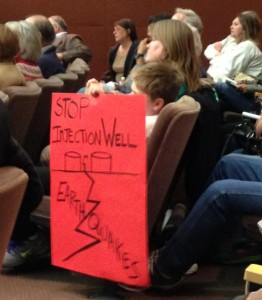Texas Citizens Affected by Recent Earthquakes Demand Fracking Regulations at the Railroad Commission
Small towns like Azle and Springtown, in the North Texas area have experienced about 32 earthquakes over the past two months leaving citizens concerned about what is happening to their home.
According to a recent study from the University of Texas, most earthquakes that are coming from the area are a few miles from the Barnett Shale region. The study also found correlation between injection wells and small earthquakes. These disposal wells contain chemical contaminated wastewater from oil and gas drilling.. This is part of the process of hydraulic fracturing or “fracking”.
The Railroad Commission has not publicly acknowledge the link between disposal wells and quakes, even with evidence from several studies from Duke University, Cornel University, University of Texas, Texas Christian University, Southern Methodist University and other universities.
According to a story on NPR StateImpact, studies found that oil and gas wastewater disposal wells are a reason for the Eagle Mountain Lake quakes. Disposal wells that inject at higher rates are likely causing quakes. Studies show that these large amounts of wastewater can cause inactive faults to slip, which causes an earthquake to occur.
In another NPR StateImpact story by Terrence Henry, he writes that under state law, the Commission cannot suspend a disposal well permit unless the operator is in violation of commission rules. There are currently no rules on seismicity, and without this rule the commission has no authority to shut it down. The article also goes on to say that the Railroad Commission is aware of such studies and research linking disposal wells and other drilling activity to man-made quakes, but publicly calls this evidence “theories.”

A town hall meeting in Azle, Texas hosted by the Texas Railroad Commission on January 2nd drew 850 residents. The residents had concerns about cracks in their property, sinkholes, earthquake insurance, and possibly having their ground water affected. They wanted the commission to explain what was happening and asked if disposal wells were the reason for the recent problems. Click here to read more.
The Commission told attendees it would further study the issue of injection wells and quakes, but residents felt they were getting a runaround. Days after this first meeting the Commission announced it would hire a seismologist to investigate local drill sites.
The following week, before the second meeting in Austin, State Representative Jim Keffer, R-Eastland, chairman of the House Energy Resources Committee, announced the creation of the Subcommittee on Seismic Activity. This Subcommittee will take measures to review research, past studies, testimony, and input from the Commission and UT’s Bureau of Economic Geology to see if changes are needed regarding the regulation of activities that impact these quakes. Click here to see NPR StateImpact coverage
On Tuesday January 21st, North Texans organized another meeting in front of state regulators demanding a moratorium on hydraulic fracturing disposal wells until they got answers about the recent earthquakes. Residents of various ages and backgrounds came to speak about the integrity of oil and gas wells, property values, the need for stronger regulations on injection wells, pollution in water resources, and ways to pay for damages.
Some residents want the Commission to act now and study later. They question what new information the Commission’s hired seismologist expects to find amid the studies and research already done. Residents described the impacts they were experiencing – being woken up at all hours of the night, the concern for the safety of their children, and the sudden appearance and growth of sinkholes in the area, which have grown to about 12-feet. Linda Stokes, the mayor of Reno asked the Commission, “…to not make citizens of Reno and Azle the guinea pigs for the study.”
Chairman Smitherman said that an injection well moratorium is not within the Commission’s authority, but that they can take action on individual permits. In order for these disposal wells to be shut down as requested, the companies would have to violate their permits from the Commission, but with permits continuing to leave out regulation for seismic activity we have to wait and see what the subcommittee on seismic activity can accomplish.
Click here for more information from Sierra Club’s Texas Green Report.